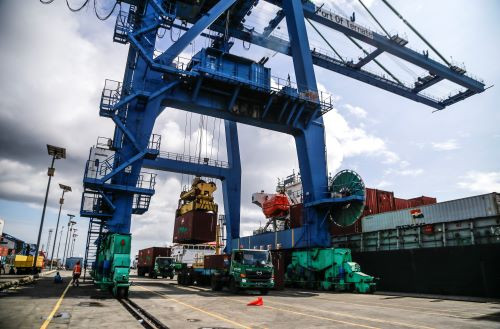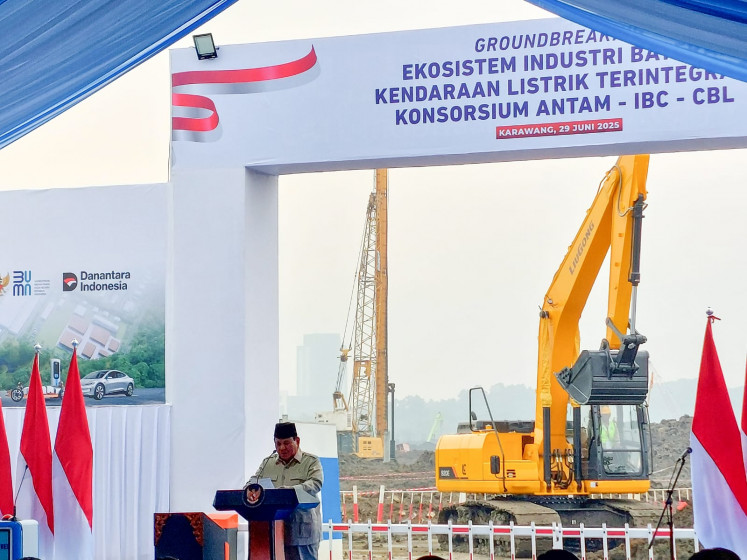Popular Reads
Top Results
Can't find what you're looking for?
View all search resultsPopular Reads
Top Results
Can't find what you're looking for?
View all search resultsNusantaranger.com: Calling all superheroes of the Archipelago
Nusantaranger
Change text size
Gift Premium Articles
to Anyone

Nusantaranger.com
The 1990s generation's perception of the suling sakti, or magic flute, differs from that of the younger generation.
When they hear the term, Tommy Green Ranger from Power Rangers comes to mind. Today's children, however, associate the term with Goyang Caesar, or the Caesar Dance, which has become famous due to a live comedy program on TV.
'Children who grew up in the 1990s era were raised with heroic concepts from children's entertainment programs whether cartoons or live-action series. They taught a credo that 'fighting for the truth is cool',' said Sweta Kartika, comic artist for Nusantaranger.com.
'On the other hand mass-media programs nowadays teach that 'to become famous is easy'. All you have to do is dance, act silly and then upload it to the media. For some people who embrace the values of creativity and hard work, this is regarded as very disturbing.'
Together ' Shani Budi Pandita, Tamalia 'Tami' Arundhina, Sweta Kartika, Bisri 'Ova' Mustova, Keinesasih 'Ines' Hapsari Puteri and Indra 'Nabun' Arista ' have worked hard researching Indonesian culture for the development of the Nusantaranger product.

The result is five youths given super powers from a variety of Indonesia's major islands to protect the world from evil.
Nusantaranger presents the new superheroes as a way to introduce Indonesia's traditional culture in a pop-culture approach to Indonesian children.
The local heroes have adopted Japan's Super Sentai form, known as Power Rangers on national TV. The form represents Indonesian values such as gotong-royong (working together) and Bhinneka Tunggal Ika, the country's unity-in-diversity slogan.
'As the writer, I have researched character development. Every actor in Nusantaranger has different cultural roots based on their origins ' Sumatra, Kalimantan, Java and Papua. The 'flavor' of Indonesia is not only delivered with the drawings or stories, but also through the characters,' Ines says.
They conducted their research at the National Museum, on the Internet and from knowledge shared by the Jagawana ' Nusantaranger's loyal readers.
The online comic has packaged local legends, weaponry, landscapes, traditional costumes and history in a lighter format so children will easily digest the values.
'Nusantaranger made us realize cool things about Indonesia that we were not aware of before and that our teachers did not teach us at school. For example, Papua's endemic animals, like the dashing large-tooth sawfish,' said Ova, the designer.
Formerly, Nusantaranger's basic idea was in the form of a web series. It was triggered by the TV series, Bima Satria Garuda, which translates the Japanese tokusatsu, or live-action television drama, into an Indonesian version of Kamen Rider.
Shani, the co-creator, shared his ideas and Tami responded by shaping the basic concept. Due to limited funds, the comic format was chosen as the most feasible medium.
The online-comic format is a common practice abroad with the support of reliable network infrastructure and large numbers of comic conventions. Popular web comics will be sold in print.
'Compared to printed comics, online comics have great potential. Comic artists can express their ideas without limits by publishers. They are also free to create comics as often as they want. The biggest challenges are attracting and sustaining the readership,' said Nabun, the project manager.
Despite its great potential, Nabun found the Indonesian comic market to be stagnant just as it was 20 years ago. Since the 1990s, no local-titled comic has had commercial success allowing comic artists to rely solely for a living on their own works.
As the Internet grew, it benefitted comic artists and promoted their work online. Yet the main discussion is still around which characteristics define the identity of Indonesian comics. The debate continues on whether Indonesian comics should copy foreign comic styles.
'Indonesian comics have made progress with the help of the Internet and social media. Anyone who wants to create a comic can easily upload it on Facebook and Twitter,' Shani said.
When first launched, #Nusantaranger climbed its way up Twitter's trending topics. With a social-media marketing strategy, Nusantaranger.com achieved 1.4 million followers and Comic.nusantaranger.com achieved 2.5 million hits in January 2014. Their Twitter hashtag landed them devoted fans.
'Our website server went down when the second and third editions were released. It showed that our readers were waiting for the latest chapters,' said Ova.
The server problem also proved they had limited financial resources to maintain the website. Other struggles derived from most of the member's full-time jobs.
But thanks to technology, they can discuss ideas through mobile messenger apps and email.
Despite their busy schedules, they seek to maintain consistency in publishing Nusantaranger on the 1st and 15th of every month.
'By this time, companies and publishers have offered to sign up with Nusantaranger. But we stay true to our initial foundation,' Ines said.
The basic idea in creating Nusantaranger was to give children local heroes as role models. With diverse entertainment products for children, they felt the need for adults to contribute guidance so that children could absorb the values of the content.
Remembering their childhoods, the team noticed a decline in the tradition of storytelling among families.
To expand its impact, Nusantaranger is preparing to expand its creative division to roll out second-line products such as card and board games.
They also hope to print the comics independently, or through a book publisher who understands their mission. The team will also take part in pop-culture conferences and promote Nusantaranger to global market.
'We want Nusantaranger to become iconic heroes for Indonesian children. We hope it will air on TV someday,' said co-director Tami.









